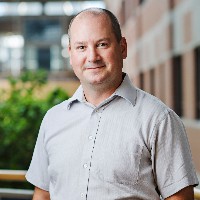Michael Suits

Associate Professor
Faculty of Science
Chemistry and Biochemistry
Waterloo, Ontario
msuits@wlu.ca
Office:
(548) 889-3824
Expert In
Languages
English
Bio/Research
I received my PhD in biochemistry working on the structural and functional characterization of heme degradation proteins for iron acquisition by a pathogenic strain of Escherichia coli (O157:H7). In parallel I worked on the lipopolysaccharide transport protein LptA.
Prior to joining Laur...
Click to Expand >>
Prior to joining Laur...
Click to Expand >>
Bio/Research
I received my PhD in biochemistry working on the structural and functional characterization of heme degradation proteins for iron acquisition by a pathogenic strain of Escherichia coli (O157:H7). In parallel I worked on the lipopolysaccharide transport protein LptA.
Prior to joining Laurier, I was a European Molecular Biology Organization Fellow at The York Structural Biology Laboratory where my work focused on the structure-function relationship of microbial carbohydrate-active enzymes (CAZymes). CAZymes describe families of structurally related, catalytic and carbohydrate-binding modules that degrade, modify or create glycosidic bonds. I continued this line of research, focusing on the characterization of pneumococcal CAZymes at the University of Victoria as a Michael Smith Foundation for Health Research Fellow. During this period, I was also part of a collaboration involving the structural characterization of receptor-antibody complexes.
Research in the Suits lab focuses on relating structural details of proteins with their biochemical and molecular functions. Broadly this involves investigating carbohydrate recognition and processing and has recently expanded to characterize keystone molecular events propagated by the oral microbiome.
Beyond the universally recognized role for carbohydrates as nutrient sources, complex carbohydrates in the form of polysaccharides, proteoglycans and glycolipids may be considered to be "the language of the cell" in that they mediate many integral biological events. Because of this central importance, research projects in our lab utilize X-ray crystallography and supportive biophysical methods to characterize the interaction between proteins and carbohydrates. Our primary work focuses on long, linear carbohydrates such as chondroitin, heparan, hyaluronan, alginate and pectin, and microbial factors that recognize and process these important cell surface molecules.
A second interest for our group is characterizing the molecular cross-talk between bacteria in the oral cavity as well as the proteins and enzymes responsible for synthesis of extracellular polymeric substance, also known as biofilm.
Click to Shrink <<
Prior to joining Laurier, I was a European Molecular Biology Organization Fellow at The York Structural Biology Laboratory where my work focused on the structure-function relationship of microbial carbohydrate-active enzymes (CAZymes). CAZymes describe families of structurally related, catalytic and carbohydrate-binding modules that degrade, modify or create glycosidic bonds. I continued this line of research, focusing on the characterization of pneumococcal CAZymes at the University of Victoria as a Michael Smith Foundation for Health Research Fellow. During this period, I was also part of a collaboration involving the structural characterization of receptor-antibody complexes.
Research in the Suits lab focuses on relating structural details of proteins with their biochemical and molecular functions. Broadly this involves investigating carbohydrate recognition and processing and has recently expanded to characterize keystone molecular events propagated by the oral microbiome.
Beyond the universally recognized role for carbohydrates as nutrient sources, complex carbohydrates in the form of polysaccharides, proteoglycans and glycolipids may be considered to be "the language of the cell" in that they mediate many integral biological events. Because of this central importance, research projects in our lab utilize X-ray crystallography and supportive biophysical methods to characterize the interaction between proteins and carbohydrates. Our primary work focuses on long, linear carbohydrates such as chondroitin, heparan, hyaluronan, alginate and pectin, and microbial factors that recognize and process these important cell surface molecules.
A second interest for our group is characterizing the molecular cross-talk between bacteria in the oral cavity as well as the proteins and enzymes responsible for synthesis of extracellular polymeric substance, also known as biofilm.
Click to Shrink <<
Media Relations
Aonghus Kealy
Communications and Media Relations Officer
akealy@wlu.ca
(548) 889-4855
Click to Expand >>
Communications and Media Relations Officer
akealy@wlu.ca
(548) 889-4855
Click to Expand >>
Media Relations
Aonghus Kealy
Communications and Media Relations Officer
akealy@wlu.ca
(548) 889-4855
Lori Chalmers Morrison
Director: Integrated Communications
lchalmersmorrison@wlu.ca
(548) 889-4857
Vanessa Barrasa
Director: Communications & Issues Management
vbarrasa@wlu.ca
(548) 889-3812
Brantford Campus:
Beth Gurney
Director, Strategic Communications and Community Engagement
bgurney@wlu.ca
(548) 889-4199
Click to Shrink <<
Communications and Media Relations Officer
akealy@wlu.ca
(548) 889-4855
Lori Chalmers Morrison
Director: Integrated Communications
lchalmersmorrison@wlu.ca
(548) 889-4857
Vanessa Barrasa
Director: Communications & Issues Management
vbarrasa@wlu.ca
(548) 889-3812
Brantford Campus:
Beth Gurney
Director, Strategic Communications and Community Engagement
bgurney@wlu.ca
(548) 889-4199
Click to Shrink <<